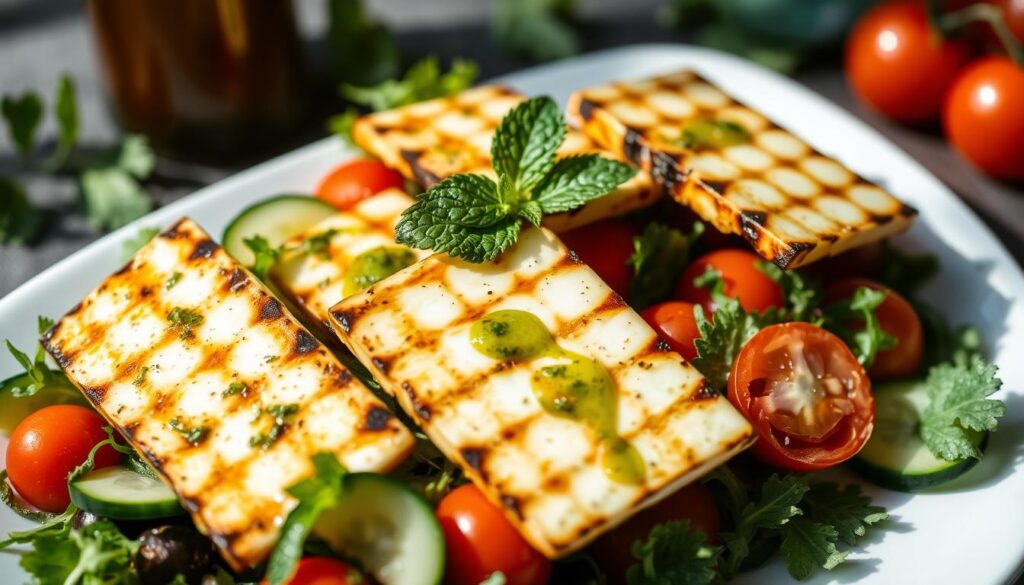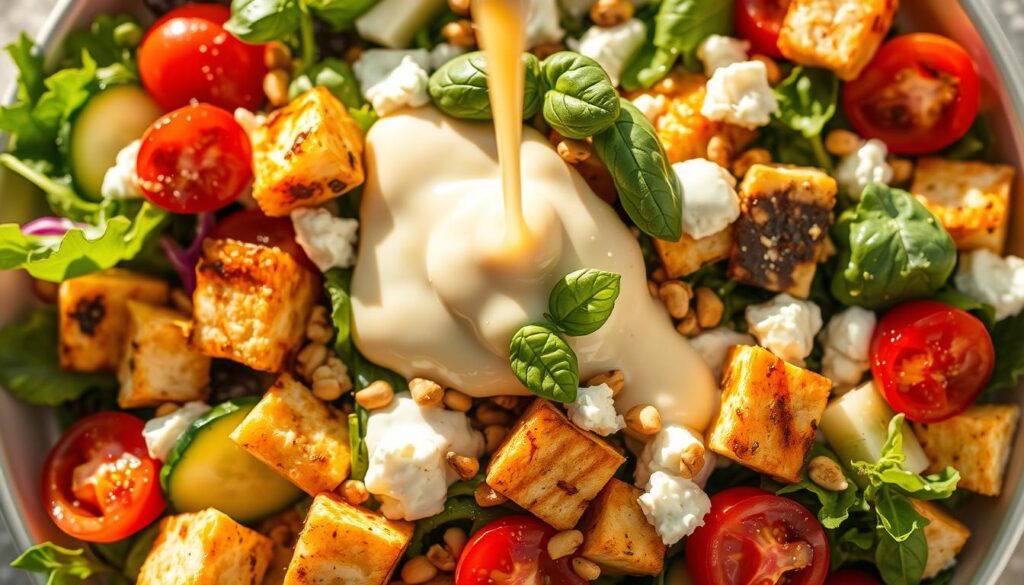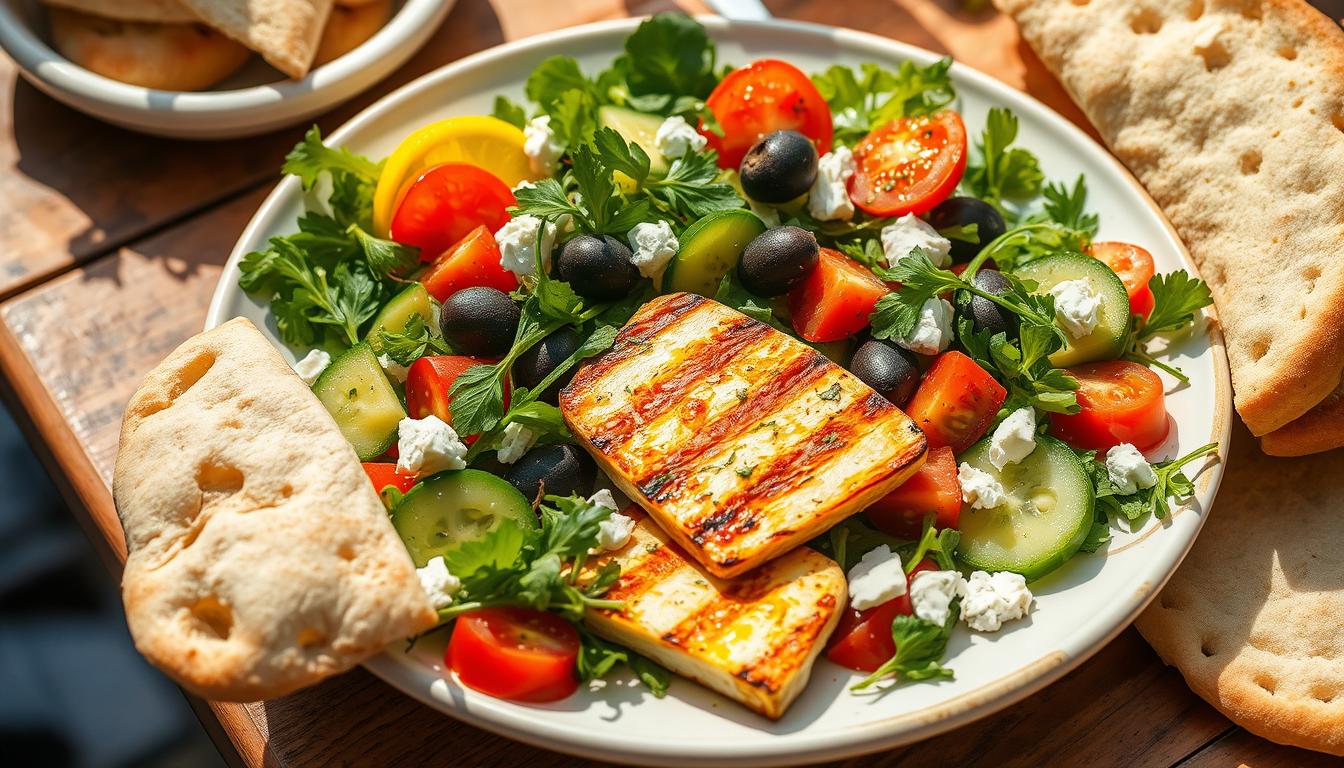Imagine yourself on a warm Mediterranean island, surrounded by the scent of fresh herbs and the sound of sizzling cheese. You’re about to experience the delightful taste of a grilled halloumi salad, a dish that embodies the essence of Mediterranean cuisine.
This salad is a perfect blend of savory halloumi cheese, crisp greens, and a zesty dressing, making it a healthy and flavorful meal option. Originating from Cyprus, halloumi cheese is known for its unique texture that retains its shape when grilled, adding a salty, milky flavor to the dish.
As you explore the world of Mediterranean cuisine, you’ll discover that this salad is a staple dish that brings people together. With its rich flavors and nutritional benefits, it’s no wonder that the mediterranean halloumi salad has gained popularity worldwide.
Table of Contents
ToggleKey Takeaways
- Discover the origins of halloumi cheese and its unique characteristics.
- Learn about the nutritional benefits of incorporating halloumi cheese into your diet.
- Explore a simple recipe to prepare a delicious grilled halloumi salad.
- Understand the importance of using fresh ingredients in Mediterranean cuisine.
- Get tips on how to customize your salad to suit your taste preferences.
The Mediterranean Origins of Halloumi Cheese
Cyprus, a small island in the Mediterranean, is the birthplace of halloumi cheese, a culinary delight enjoyed worldwide. Halloumi cheese has its roots deeply embedded in the Mediterranean diet, with a history that dates back centuries.
The History of Halloumi in Cyprus and Greece
Traditionally made from sheep’s or goat’s milk, halloumi cheese was initially produced as a way to preserve milk. Its unique texture and flavor made it a staple in the Mediterranean diet. The cheese was particularly significant in Cyprus, where it was consumed daily, and its popularity soon spread to other parts of the region, including Greece.
The production of halloumi involves a meticulous process that has been passed down through generations. The cheese is known for its salty, milky flavor and is often served grilled or fried, making it a versatile ingredient in various Mediterranean dishes, including the popular halloumi salad recipe.
How Halloumi Became Popular Worldwide
As global cuisine became more interconnected, halloumi cheese gained international recognition. Its versatility and distinctive taste made it a favorite among chefs and food enthusiasts. Today, halloumi is enjoyed not only in traditional Mediterranean dishes but also in innovative recipes, further cementing its place in global culinary culture.
The rise of halloumi cheese to global fame is a testament to the rich culinary heritage of the Mediterranean region. As a key ingredient in many recipes, including the beloved halloumi cheese dish, it continues to delight palates around the world.
What Makes Halloumi Cheese Special
The uniqueness of halloumi cheese lies in its texture and grilling properties. Halloumi is a type of cheese that originates from Cyprus and is known for its semi-hard texture and salty, milky flavor. Its distinct characteristics make it an ideal ingredient for various dishes, including salads and sandwiches.
The Unique Texture and Flavor Profile
One of the standout features of halloumi cheese is its unique texture. Unlike many other cheeses, halloumi has a high melting point, which makes it perfect for grilling. When cooked, it develops a golden-brown crust on the outside while remaining soft and creamy on the inside. The flavor profile of halloumi is characterized by its salty, milky taste, making it a versatile ingredient in various recipes, including vegetarian halloumi salad.
Why Halloumi Doesn't Melt When Grilled
So, why doesn’t halloumi melt when grilled? The reason lies in its high melting point. Halloumi cheese is made from a mixture of goat’s and sheep’s milk, which is then heated to a high temperature. This process gives halloumi its unique property of retaining its shape when grilled. As a result, halloumi cheese salad becomes a delightful and visually appealing dish, perfect for any occasion.
Essential Ingredients for a Perfect Grilled Halloumi Salad
The foundation of a fantastic grilled halloumi salad is built on the quality of its ingredients. To create an easy halloumi salad, you need to start with the basics: high-quality halloumi cheese, fresh produce, and complementary herbs and spices.
Selecting the Best Halloumi Cheese
When it comes to halloumi, the quality of the cheese is paramount. You have the option to choose between store-bought and specialty cheese shop products.
Store-Bought vs. Specialty Cheese Shop Options
Store-bought halloumi can be convenient, but specialty cheese shops often offer higher quality and more authentic products. Consider visiting a specialty store for a more nuanced flavor profile.
Reading Labels and Ingredients
Regardless of where you buy your halloumi, reading the labels is crucial. Look for products made from high-quality milk, with minimal additives.
Fresh Produce and Greens to Include
A halloumi and vegetable salad isn’t complete without fresh, crisp produce. Include a variety of greens like mint, parsley, and arugula, along with juicy tomatoes and cucumbers.
Complementary Herbs and Spices
To elevate your salad, incorporate complementary herbs and spices. A sprinkle of black pepper, a drizzle of olive oil, and a squeeze of lemon can make all the difference. As one chef notes,
“The right herbs can transform a simple halloumi salad into a culinary delight.”
By focusing on these essential ingredients, you’ll be well on your way to creating a delicious and easy halloumi salad that’s perfect for any occasion.
Step-by-Step Guide to Grilling Halloumi
The key to a deliciously grilled halloumi lies in its preparation and the technique used during the grilling process. Grilling halloumi to perfection is a straightforward process that requires some basic knowledge and techniques.
Preparing the Cheese for Grilling
To grill halloumi effectively, you first need to prepare it correctly. Slice the halloumi into thick slabs, about 1/2 inch or 1 cm thick. This thickness ensures that the cheese holds its shape while grilling. After slicing, pat the halloumi dry with a paper towel to remove excess moisture, which helps in achieving a nice golden-brown crust.
Grilling Techniques for Perfect Results
Grilling halloumi can be done using either a stovetop or an outdoor grill. The technique remains largely the same for both methods.
Stovetop Grilling Method
For stovetop grilling, heat a non-stick skillet or griddle over medium-high heat. Once hot, place the halloumi slices in the skillet. Grill for about 2-3 minutes on each side, or until you achieve a golden-brown crust.
Outdoor Grill Approach
If using an outdoor grill, preheat it to medium-high heat. Brush the grates with a little oil to prevent sticking. Place the halloumi slices on the grill and cook for 2-3 minutes per side, until nicely charred.
Common Mistakes to Avoid
One of the most common mistakes when grilling halloumi is not preparing it correctly, leading to a soft or burnt texture. Ensure you:
- Slice the halloumi to the right thickness.
- Pat dry the slices before grilling.
- Don’t overcrowd the grill or skillet.
By following these steps and avoiding common pitfalls, you’ll be able to create a delicious summer halloumi salad or a grilled halloumi salad with mint dressing that’s sure to impress.

The Ultimate Grilled Halloumi Salad Recipe
Now that you’ve mastered grilling halloumi, it’s time to create a delicious salad around this Mediterranean delight. A well-crafted grilled halloumi salad can elevate your dining experience, offering a perfect blend of textures and flavors.
Ingredients List and Preparation Time
To make an easy halloumi salad recipe, you’ll need the following ingredients:
- 1 block of halloumi cheese
- 4 cups mixed greens
- 1 cup cherry tomatoes, halved
- 1/2 cup sliced cucumbers
- 1/4 cup chopped fresh mint
- 2 tbsp olive oil
- 1 tbsp lemon juice
- Salt and pepper to taste
Preparation time is approximately15 minutes, and cooking time is around5-7 minutes.
Detailed Cooking Instructions
Follow these steps to create a delicious halloumi salad:
- Preheat your grill or grill pan to medium-high heat.
- Slice the halloumi into1/2-inch thick pieces and grill for2-3 minutes per side, until golden.
- In a large bowl, combine mixed greens, cherry tomatoes, cucumbers, and fresh mint.
- Once the halloumi is grilled, let it cool for a minute or two before adding it to the salad.
- Drizzle with olive oil and lemon juice, and season with salt and pepper to taste.
Presentation and Serving Suggestions
To enhance the visual appeal of your salad, consider the following presentation tips:
- Arrange the grilled halloumi on top of the salad in a decorative pattern.
- Garnish with additional fresh herbs, such as mint or parsley.
- Serve immediately, while the halloumi is still slightly warm.
By following these simple steps, you’ll be able to create a stunning and delicious halloumi salad that’s sure to impress your guests.
Delicious Dressings That Complement Grilled Halloumi
To enhance your grilled halloumi experience, consider these delicious dressing options. The right dressing can bring together the various flavors and textures of your salad, creating a truly memorable dish.

Lemon and Olive Oil Dressing
A simple yet effective option is a lemon and olive oil dressing. This classic combination is a staple in Mediterranean cuisine and pairs perfectly with the salty flavor of halloumi. To make, mix freshly squeezed lemon juice with high-quality olive oil, and season with salt and pepper to taste.
Balsamic Glaze Options
For a sweeter and thicker dressing, consider using a balsamic glaze. This rich and fruity option complements the milky flavor of halloumi, adding depth to your salad. You can either purchase a pre-made glaze or make your own by reducing balsamic vinegar on the stovetop.
Herb-Infused Dressings
Herb-infused dressings offer a fresh and aromatic alternative. Two popular combinations include:
Mint and Parsley Dressing
Mixing chopped fresh mint and parsley into your dressing adds a bright and refreshing flavor. This pairs well with the warm, grilled halloumi.
Basil and Oregano Combination
Alternatively, combining basil and oregano creates a herbaceous and slightly earthy dressing that complements the cheese nicely. Experiment with different herb ratios to find your perfect blend.
Seasonal Variations of Grilled Halloumi Salad
One of the best things about grilled halloumi salad is its flexibility to reflect the freshest produce of each season. By incorporating seasonal ingredients, you can keep your grilled halloumi salad exciting and fresh throughout the year.
Summer Grilled Halloumi Salad with Watermelon
In the summer, a refreshing twist on the traditional grilled halloumi salad can be achieved by adding watermelon. The sweetness of the watermelon complements the saltiness of the halloumi, creating a delightful flavor combination. To make this variation, simply dice fresh watermelon and add it to your salad along with mint leaves and a drizzle of lemon juice.
Fall Harvest Halloumi Salad
During the fall season, you can incorporate harvest ingredients like roasted vegetables into your grilled halloumi salad. Roasted butternut squash, beets, or carrots add a depth of flavor and texture that complements the grilled halloumi. Simply roast your chosen vegetables with olive oil, salt, and pepper, then toss them with the grilled halloumi, mixed greens, and a balsamic glaze.
Winter and Spring Adaptations
In the winter, consider adding hearty greens like kale and citrus segments to your grilled halloumi salad for a burst of freshness. For spring, incorporate fresh herbs like parsley or dill, and add some lightly steamed asparagus or peas for a vibrant and healthy twist. These seasonal adaptations ensure that your grilled halloumi salad remains a dynamic and appealing dish all year round.
| Season | Key Ingredients | Tips |
|---|---|---|
| Summer | Watermelon, mint, lemon juice | Add diced watermelon for a refreshing twist |
| Fall | Roasted vegetables, balsamic glaze | Roast vegetables like butternut squash or beets for added depth |
| Winter | Kale, citrus segments | Use hearty greens and citrus for a fresh winter salad |
| Spring | Fresh herbs, asparagus, peas | Incorporate lightly steamed vegetables for a vibrant spring salad |
Nutritional Benefits of Grilled Halloumi Salad
Grilled halloumi salad is a nutrient-rich dish that combines the goodness of halloumi cheese with fresh vegetables, making it a great option for a healthy meal. Halloumi cheese, when grilled and paired with vegetables, creates a salad that is not only delicious but also packed with nutrients.
Protein and Calcium Content
One of the key nutritional benefits of grilled halloumi salad is its high protein and calcium content, courtesy of the halloumi cheese. A serving of halloumi cheese can provide a significant amount of protein, essential for muscle repair and growth. Additionally, the calcium in halloumi supports bone health, making this salad an excellent choice for those looking to strengthen their bones.
Balancing the Meal with Vegetables
When you pair halloumi cheese with a variety of vegetables in a salad, you create a well-rounded meal that is rich in vitamins, minerals, and antioxidants. Vegetables like tomatoes, cucumbers, and bell peppers add fiber, vitamin C, and other essential nutrients, enhancing the overall nutritional profile of the dish.
Considerations for Different Dietary Needs
You can easily adapt grilled halloumi salad to suit various dietary requirements. Whether you’re looking to reduce sodium intake or follow a gluten-free diet, adjustments can be made to accommodate your needs.
Adjustments for Low-Sodium Diets
For those on a low-sodium diet, it’s essential to be mindful of the salt content in halloumi cheese. You can reduce the sodium by rinsing the cheese before grilling or by using a low-sodium alternative. Additionally, seasoning the salad with herbs and spices instead of salt can further reduce sodium intake.
Making It Gluten-Free
Grilled halloumi salad is naturally gluten-free, making it an excellent option for those with gluten intolerance or sensitivity. Ensure that any added ingredients, such as dressings or marinades, are also gluten-free to maintain the dish’s gluten-free status.
| Nutrient | Amount per Serving | % Daily Value |
|---|---|---|
| Protein | 20g | 40% |
| Calcium | 300mg | 30% |
| Vitamin C | 50mg | 60% |
Pairing Your Grilled Halloumi Salad with Beverages
When enjoying a grilled halloumi salad, the right beverage pairing can elevate your dining experience. The key is to find a drink that complements the salad’s flavors without overpowering them.
Wine Recommendations
For those who enjoy wine, there are several options that pair well with grilled halloumi salad. The crisp acidity and subtle flavors of certain white wines make them an excellent choice.
White Wine Options
Consider a dry Chardonnay or a refreshing Sauvignon Blanc. These wines complement the salty flavor of halloumi without overwhelming the other ingredients in the salad.
Rosé Selections
A dry Rosé can also be a delightful match, offering a fruity and refreshing contrast to the savory halloumi.
Non-Alcoholic Pairing Options
For those preferring non-alcoholic beverages, there are plenty of options that can complement grilled halloumi salad. Freshly squeezed juices or herbal teas can provide a refreshing contrast.
Traditional Mediterranean Drinks
Mediterranean drinks like lemon and mint tea or jallab (a drink made from date syrup, molasses, and rose water) can add a unique twist to your meal. These beverages are not only flavorful but also culturally relevant, enhancing the overall dining experience.
| Beverage Type | Recommended Options | Why It Pairs Well |
|---|---|---|
| White Wine | Chardonnay, Sauvignon Blanc | Crisp acidity complements halloumi’s salty flavor |
| Rosé | Dry Rosé | Fruity and refreshing, contrasts savory halloumi |
| Non-Alcoholic | Freshly squeezed juices, herbal teas | Provides a refreshing contrast |
Creative Twists on the Traditional Grilled Halloumi Salad
Grilled halloumi salad is a versatile dish that can be elevated with creative twists. You can experiment with various ingredients to create a unique halloumi and vegetable salad that suits your taste.
Adding Fruits and Nuts
Incorporating fruits like watermelon or pomegranate seeds can add a sweet and refreshing touch to your summer halloumi salad. Nuts such as almonds or pistachios provide a satisfying crunch. Consider combining these elements for a delightful contrast in textures.
Incorporating Grains and Legumes
Adding grains like quinoa or farro can enhance the nutritional value and texture of your grilled halloumi salad. Legumes such as chickpeas or black beans can also be included to boost protein content. These ingredients can make your salad more filling and satisfying.
Fusion Cuisine Inspirations
Exploring fusion cuisine can lead to exciting variations of the traditional grilled halloumi salad. You can draw inspiration from different culinary traditions to create something unique.
Asian-Mediterranean Fusion
Combining Mediterranean halloumi with Asian flavors like soy sauce or ginger can result in a fascinating fusion. This blend can add a new dimension to your halloumi and vegetable salad.
Mexican-Inspired Variations
Incorporating Mexican elements such as avocado, cilantro, or lime juice can give your summer halloumi salad a vibrant twist. This fusion can make for a refreshing and zesty salad.
Conclusion: Why Grilled Halloumi Salad Deserves a Place in Your Recipe Collection
Grilled halloumi salad is a versatile and delicious dish that can be adapted to various tastes and dietary needs, making it an excellent addition to your recipe collection. With its unique flavor profile and numerous nutritional benefits, this Mediterranean delight is perfect for a wide range of occasions.
You can enjoy a delicious halloumi salad as a quick and easy meal or as a dish to impress your guests. The addition of a refreshing mint dressing elevates the grilled halloumi salad, creating a truly unforgettable culinary experience. Try experimenting with different variations, such as a grilled halloumi salad with mint dressing, to find your favorite.
By incorporating grilled halloumi salad into your meal rotation, you’ll not only be treating your taste buds to a delicious and satisfying experience but also benefiting from the nutritional value of this dish. So, explore the many creative variations of grilled halloumi salad and discover why it’s a great choice for any occasion.
FAQ
What is halloumi cheese, and where does it originate from?
Halloumi cheese is a traditional Cypriot cheese made from sheep’s or goat’s milk, or a combination of both. It originates from Cyprus and has been a staple in the Mediterranean diet for centuries.
How do I grill halloumi cheese to perfection?
To grill halloumi cheese, slice it into thick pieces, pat dry with a paper towel, and grill over medium heat until golden brown on both sides. Make sure to not overcook it, as it can become too crispy.
What are some essential ingredients for a grilled halloumi salad?
Essential ingredients for a grilled halloumi salad include fresh greens, juicy tomatoes, cucumbers, red onions, and a tangy dressing. You can also add herbs like mint and parsley, and spices to taste.
Can I make a grilled halloumi salad ahead of time?
While you can prepare some components of the salad ahead of time, such as chopping the vegetables, it’s best to grill the halloumi just before serving to ensure it remains crispy and warm.
What are some dressing options that complement grilled halloumi?
Popular dressing options for grilled halloumi salad include a simple lemon and olive oil dressing, balsamic glaze, or herb-infused dressings like mint and parsley or basil and oregano.
Is grilled halloumi salad a healthy option?
Grilled halloumi salad can be a healthy option when made with a variety of vegetables, lean protein, and a balanced dressing. Halloumi cheese is a good source of protein and calcium, but it’s also relatively high in calories and sodium.
Can I customize grilled halloumi salad to suit different dietary needs?
Yes, you can customize grilled halloumi salad to suit different dietary needs by adjusting the ingredients. For example, you can use low-sodium halloumi or reduce the amount of cheese used, and add more vegetables to increase the nutrient density.
What beverages pair well with grilled halloumi salad?
Grilled halloumi salad pairs well with white wine, rosé, or sparkling water with a squeeze of lemon. You can also try traditional Mediterranean drinks like herbal teas or freshly squeezed juices.
Can I add fruits or nuts to grilled halloumi salad?
Yes, you can add fruits like watermelon or pomegranate seeds, and nuts like almonds or pistachios to grilled halloumi salad to add texture, flavor, and nutrition.
How can I make grilled halloumi salad more substantial?
You can make grilled halloumi salad more substantial by adding grains like quinoa or couscous, legumes like chickpeas or lentils, or other protein sources like grilled chicken or tofu.

